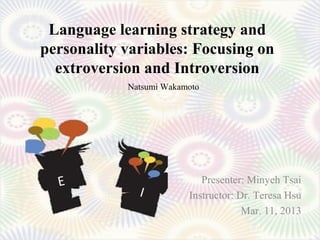
Language learning strategy and personality variables focusing on extroversion and introversion
- 1. Language learning strategy and personality variables: Focusing on extroversion and Introversion Natsumi Wakamoto E Presenter: Minyeh Tsai I Instructor: Dr. Teresa Hsu Mar. 11, 2013
- 2. Citation Wakamoto, N. (2000). Language learning strategy and personality variables: Focusing on extroversion and introversion. IRAL: International Review of Applied Linguistics in Language Teaching, 38(1), 71-81. 2
- 3. Table of contents I. Introduction II. Literature Review III. Methodology IV. Results and Discussion V. Conclusion 3
- 4. Introduction 4
- 5. Introduction In Japan where English is learned as a foreign language (EFL), with large classes of forty students and only one teacher, it's quite difficult for teachers to take learners' individual factors or learning strategies into consideration. 5
- 6. Purpose To determine differences in strategy use between extroverted learners and introverted learners; that is to identify the LLS (language learning strategy) most typically used by extroverted learners and introverted learners. 6
- 7. Literature review 7
- 8. Literature Review Extroversion or Introversion is a widely acknowledged concept, and it seems that one can judge whether one's own personality is introverted or extroverted. (Wakamoto, 2000) 8
- 9. Literature Review According to Sakano, extroversion and Introversion coexist in every person, but in a different ratio and people are judged relatively extroverted or introverted. (Sakano, 1990) 9
- 10. Literature Review Functional practice strategies Extroverts Social strategies Functional practice strategies: Seeking practice opportunities outside class Introverts Learning alone Extroverts prefer Socialstrategies and functional practice social strategies: Cooperatingthe other hand, or askingpreferclarification strategies. On with others introverts for learning alone best, avoiding social contact and surprise, and thus their strategies clearly contrast with those of extroverts. (Ehrman & Oxford, 1990) 10
- 11. Method 11
- 12. Method 12
- 13. MBTI questionnaire 13
- 14. SILL questionnaire I ask English speakers to correct me when I talk. (1) never or almost never true of me (2) usually not true of me (3) somewhat true of me (4) usually true of me (5) always or almost true of me I practice English with other students. (1)never or almost never true of me (2) usually not true of me (3) somewhat true of me (4) usually true of me (5) always or almost true of me 14
- 15. Results and discussion 15
- 16. Descriptive statistics: MBTI There are more extroverts than introverts as far as the informants in this study are concerned. 16
- 17. Factor analysis for SILL Factor 113 items (functional practice strategies) Factor 212 items (strategies for maintaining communication) Factor 39 items (metacognitive strategies) Factor 48 items (memory strategies) Factor 56 items (social-affective strategies) Factor 62 items (general study strategies) 17
- 18. Pearson’s correlation coefficients between extroversion/introversion and six factors Factor 1 and Factor 5 have a positive significant correlation with extroversion and no significant correlation was found with introversion. 18
- 19. T-test for differences between I-Group and E-Group Table 4 shows that extroverts are using Factor l and 5 strategies significantly more than introverts. 19
- 20. Significant correlations: Extroversion/introversion and SILL in the result of T-tests for differences between I-Group and E-Group The author found great variance of subjects from very introverted to very extroverted. 20
- 21. Discussions I. We could see the range in the variance of learners' extroversion and Introversion. II. We could see the significantly correlated LLS for extroverts, which are labeled functional practice strategies and social-affective strategies. III. With regard to introverts, we could see no preferred LLS; however, this might have been caused by the data collection method. 21
- 22. Conclusion 22
- 23. Conclusion We could see some implications for teaching: ideas for strategy training and ideas for creating a low-risk climate in the classroom, using various modes of learning. 23
- 24. Limitation In this study, 222 Japanese students majored in English were presumably high motivation to learn English; however, the results were be totally different if the students are in other fields instead of English major. 24
- 25. woof woof Thank you for listening. 25